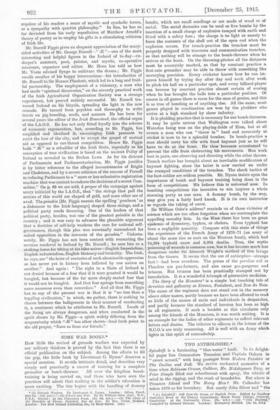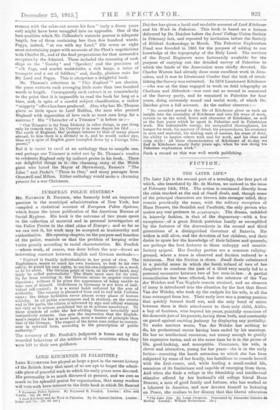TWO ANTHOLOGIES.*
Spindrift is a fascinating " blue-water " book. Iu its delight. ful pages live Commodore Trunnion and Captain Oakum in " sweet accord," with long passages from Modern Painters or The Decline and FaU. Wo revive enchanted memories of a time when Robinson Crusoe, Gulliver, Mr. Midshipman Easy, or Peter Simple filled our schoolrooms with spray, the whistle of wind in the rigging, and the crash of broadsides. But where is Treasure Island and The Merry Men ? Mr. Callender has taken 1870 as his boundary. But surely John Silver and " the • (1) Spindrift: sale from the Ocean of English Prose. Edited by ocean), Callender, lead of the History Department, Royal Naval College, Osborne. Cambridge at the University Press. i3s. net.1---(2) "This England," Compiled by Edward Thomas. London: liumphrey Milford. I.:8. ed. net. ,1
seaman with the sabre-cut across his face " (only a dozen years out) might have been smuggled into an appendix. One of the hest qualities which Mr. Callender's extracts possess is adequate length, few of them containing less than five hundred words. Pepys, indeed, " at sea with my Lord," fills seven or eight most entertaining pages with accounts of the Fleet's negotiations with Charles IL, and of the final preparations for that monarch's reception by the Admiral. These included the renaming of such ships as the Naseby ' and ` Speaker,' and the provision of " silk flags, and scarlet waistcloths, a rich barge, a noise of trumpets and a set of fiddlers," and, finally, glorious suits for My Lord and Pepys. This is altogether a delightful book.
Mr. Thomas's selections in " This England "2 are shorter, the prose extracts each averaging little more than two hundred words in length. Consequently each extract is so remorselessly to the point that it is impossible to read the book for long at a time, and in spite of a careful subject classification, a rather
" snippety " effect has been produced. Also, why has Mr. Thomas given so little space to Lord Halifax, the man who praised England with ingenuities of love such as most men keep for a mistress ? His " Character of a Trimmer " is before us
Our Trimmer is far from Idolatry in other things, in one thing only he eometh near it., his Country is in scone degree his Idol . . . . The earth of England, the' perhaps inferior to that of many places abroad, to him there is a divinity in it, and he would rather dye, than see a spire of English grass trampled down by a Foreign Tres- passer."
But it is easier to cavil at an anthology than to compile one, and perhaps our Trimmer is ruled out by Mr. Thomas's resolve to celebrate England only by indirect praise in his book. There are delightful things in it—the charming story of the Welsh giant who hated the Mayor of Shrewsbury, Barnes's " The Lijao " and Peeke's " Three to One," and many passages from Clumwell and Milton. Either anthology would make a charming present for a war Christmas.



































 Previous page
Previous page